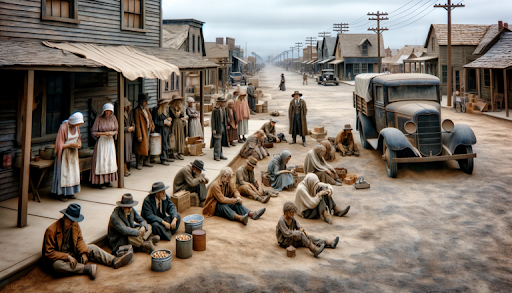The Great Depression: A Deep Dive into Its Origins
The Great Depression, one of the most catastrophic economic events in modern history, profoundly shaped the global landscape. Spanning the 1930s, it caused unprecedented economic hardship, leading to widespread unemployment, poverty, and a significant shift in economic policies. Understanding how this economic downturn came about requires delving into a complex interplay of factors, both within the United States and internationally.
1. The Roaring Twenties: Prelude to a Crash
The 1920s, often referred to as the "Roaring Twenties," was a period of significant economic prosperity and cultural change in the United States. The stock market boomed, and consumer confidence was high. Technological advancements, such as the automobile and radio, fueled consumer spending and investment. However, beneath this veneer of prosperity lay serious economic weaknesses:
- Speculative Investments: Many people invested heavily in the stock market, often with borrowed money (buying on margin). This speculation created an unsustainable bubble.
- Income Inequality: Wealth was concentrated in the hands of a few, while a significant portion of the population lived in poverty. This disparity limited the overall purchasing power and demand in the economy.
- Agricultural Overproduction: Farmers, encouraged by wartime demand, continued to produce at high levels even as demand fell, leading to falling prices and widespread debt in the agricultural sector.
2. The Stock Market Crash of 1929
The stock market crash of October 1929, often seen as the immediate trigger for the Great Depression, was a dramatic collapse in stock prices that wiped out billions of dollars of wealth. Key events include:
- Black Thursday (October 24, 1929): Panic selling ensued as stock prices began to fall sharply.
- Black Monday and Black Tuesday (October 28-29, 1929): The market suffered even more significant declines, leading to widespread panic and financial ruin.
The crash shattered consumer confidence and led to a severe contraction in spending and investment.
3. Bank Failures and Credit Contraction
As the economy worsened, a wave of bank failures swept across the country. Many banks had invested heavily in the stock market or made loans to individuals and businesses that could no longer repay them. Key points:
- Loss of Savings: Millions of people lost their life savings as banks failed, leading to further declines in consumer spending.
- Credit Contraction: With banks failing, the availability of credit dried up, making it difficult for businesses to operate and expand, leading to layoffs and further economic decline.
4. Global Trade and Economic Policies
The Great Depression was not confined to the United States; it quickly spread globally. Contributing factors included:
- Protectionist Policies: Countries, including the U.S., enacted protectionist trade policies, such as the Smoot-Hawley Tariff Act of 1930, which raised tariffs on thousands of imported goods. These policies led to a decline in international trade, exacerbating the economic downturn.
- Global Economic Linkages: Many countries were economically interdependent. The collapse of the U.S. economy led to a reduction in demand for foreign goods, impacting economies worldwide.
5. Monetary Policy Failures
The Federal Reserve's monetary policies also played a significant role in deepening the Depression:
- Inadequate Response: The Federal Reserve failed to provide sufficient liquidity to banks during the early stages of the banking crisis, leading to widespread bank failures.
- Deflation: Rather than combating deflation, the Fed's policies exacerbated it, leading to falling prices and wages, which further reduced consumer spending and investment.
6. Conclusion
The Great Depression was the result of a complex interplay of factors, including speculative investments, economic inequality, bank failures, global trade policies, and monetary policy failures. The lessons learned from this period have profoundly influenced economic policy and theory, emphasizing the need for regulation, prudent economic management, and international cooperation to prevent similar economic catastrophes in the future.
Understanding the origins of the Great Depression provides valuable insights into the vulnerabilities of modern economies and the importance of sound economic policies in maintaining stability and prosperity.

Comments
Post a Comment